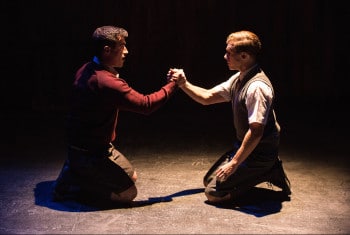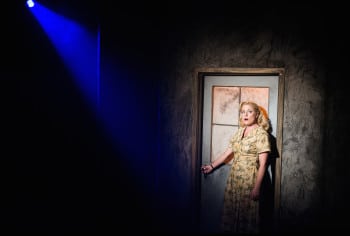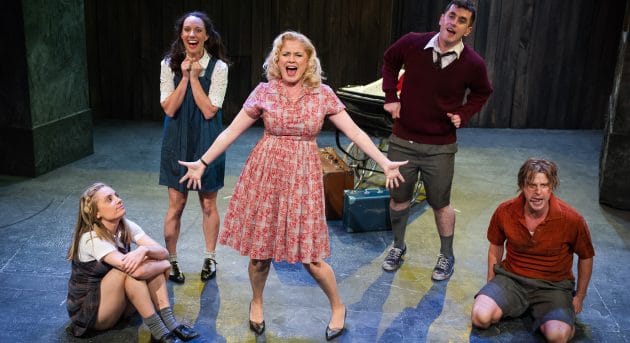Review: Blood Brothers, Hayes Theatre Co
We live within a conservative, disturbingly cruel government in 2015 Australia, where our most vulnerable citizens are the ones repeatedly targeted for more and more hardship, via our budgets and our relentless social evolution. We are not a kind country right now, particularly to those who wish to enter the country, and the difference between wealth and poverty and its respective guarantees for a better life gets stronger, sharper, and ever-bitter by the day.
So it’s the perfect time for Blood Brothers, Willy Russell’s West End phenomenon, to find a home at Sydney’s Hayes Theatre Co.

Mrs Johnstone (Helen Dallimore) has a lot of children and very little income. Her husband leaves her when she’s expecting, and she has her life planned out so that once her baby comes, her family will just be able to scrape by on the pittance she’s making cleaning the house of Mr and Mrs Lyons (Phillip Lowe and Bronwyn Mulcahy).
And then she finds out she’s having twins.
It’s too much for her to bear, and when the childless and broody Mrs Lyons hears of Mrs Johnstone’s trouble, she immediately offers a solution: give one child to me. It’s an agonising decision, but what choice does Mrs Johnstone have? She can’t raise two more children, and of course the child would have a good life as the son of the rich couple. And she’d be able to see him every day as she came to work… so the deal is done.
Of course, we’ve already been forewarned that this is not going to end well. Our Narrator (Michael Cormick) is the sinister portent of doom throughout the piece; he appears out of the shadows and in doorways, warning that the women have made a deal with the devil and he’s going to return to collect his fee.
Quickly, Mrs Lyons is threatened by the presence of Mrs Johnstone (this baby must be hers and hers alone), so she fires the struggling woman. That doesn’t, however, stop the wheels of chance, and the twins, Mickey (Bobby Fox), who stayed with Mrs Johnstone, and Edward (Blake Bowden), Mrs Lyon’s twin, meet and become fast friends. It’s the kind of heady-intense best-friendship that can only happen when you’re on the cusp of eight years old: you swear to be best friends forever and somehow you know that’s going to be true, that this other person is inextricable to your life now.
Try as they might to keep them apart – Mrs Lyons rages, moves house, loses her mind – the boys cross paths constantly, finally becoming a thick-as-thieves trio with Linda (Christy Sullivan), who has both the boys’ hearts in her hands with her wit and fearlessness.
But they are worlds apart, Mickey and Edward, despite their ferocious love for each other. Mickey ends up in a terrible job that he then loses, adrift in the unemployed masses and resigned to a limited, exceedingly hard life. Edward, of course, has no such responsibility. Money is nothing to him; he can have a prolonged adolescence at university while Mickey is trapped in a life where crime seems like a solution.

It’s a hard look at reality and that’s what helps Blood Brothers to endure. The working class aren’t singing a jaunty tune about how work is good for the soul; rather, they sing about the hardship of layoffs and the political climate (‘Take A Letter, Miss Jones’), an upbeat, relentless number that reveals its devastation with a beautiful piece of naturalistic acting from Erin James’ Miss Jones.
Across the board, the acting within the show is top-notch. Helen Dallimore is relatable and heartbreaking as Mrs Johnstone; she keeps the show together and gives it its heart; you forgive her the choice to give away a child immediately, because it’s clear that, despite being stuck between the proverbial rock and a hard place, she’s in unforgiving situation in life.
Blake Bowden delivers his best performance yet as Edward, the part fitting him perfectly. His superior vocal technique coaxes out a tenderness in Bobby Fox’s roughhousing Mickey and in ‘Long Sunday Afternoon/My Friend’ and ‘That Guy’, each have never sounded better.
The large portion of the piece that requires children to play adults really is a tricky situation at the Hayes. Go too broad, and you lose the audience. Go too small, and it will feel half-hearted. But Fox, Bowden, Sullivan, Kristian, James and Lowe run at it with complete abandon, creating fully-realised, successful portraits of childhood on stage.
Cormick’s Narrator is assured and so is his vocal delivery, in particular, he performs ‘Shoes Upon the Table’ in an urgently, perfectly indulgent rock spectacular. It sits perfectly against the quieter moments of the show, like Dallimore’s heartbreaking ‘Easy Terms’.
Mrs Lyons is a little too broad and aimlessly desperate in the second act, but Mulcahy’s performance will surely find its place as the run continues. Lowe is wonderfully steadfast as her husband, and Jamie Kristian brings a genuine sense of edge to the bad-news older brother Sammy.

Anna Gardiner’s set is good use of the notoriously small Hayes Theatre space, with moving and retracting set pieces to represent the two homes on each side of the tracks, and the lighting is big and bold by Christopher Page, adding a sense of mysticism to the story. The rest is largely left to invention, which is a good move for the Hayes; suspending disbelief is somehow easier when we’re already seeing something smaller, not deconstructed but certainly downsized.
And Blood Brothers works perfectly as a smaller show, even if it’s still a little uneven in its directorial sense of pace and emphasis (particularly on how relevant the superstition themes should be within a show that presents a nature v nurture argument quite strongly, despite superstition’s importance in history of the struggling population looking for meaning). When we are just metres away from the line for the dole, from Linda’s hurtful and hurting and somehow completely reasonable infidelity, from Edward’s joy and Mickey’s rough edges, it becomes all the more real, all the more recognisable.
And isn’t it time we were all reminded that those less fortunate in the world are exactly as human as we are and deserving of rights and a living wage and a comfortable life? Isn’t it time that we looked at people in the working and upper classes and thought, oh, it’s really all a matter of where we were born, isn’t it? Isn’t it time we realised that upward mobility is largely a farce in 2015 Australia, and find some compassion for our fellow man?
There’s a reason why Sweet Charity, the Hayes Theatre Co/Luckiest Productions smash that’s currently touring the company, resonated with us (aside from the top-notch production and excellent musical direction), and it’s so much about a no-frills depiction of class struggles and the desire for a life you can be happy with.
Beautifully, truthfully, Blood Brothers gives us this message, and at the Hayes, in Andrew Pole’s production, it’s delivered with immense talent, in a top-notch production and strong musical direction and with the kind of performances that make it easy for you to connect with a work.
Blood Brothers will make you think about the world, and it will make you feel, and that’s the best thing about it.


